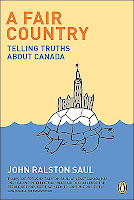 “We are a people of Aboriginal inspiration organized around a concept of peace, fairness and good government. That is what lies at the heart of our story; at the heart of Canadian mythology, whether Francophone or Anglophone.” So concludes the prologue to A Fair Country: Telling Truths about Canada, the thirteenth book by political philosopher and novelist John Ralston Saul. Undoubtedly one of
“We are a people of Aboriginal inspiration organized around a concept of peace, fairness and good government. That is what lies at the heart of our story; at the heart of Canadian mythology, whether Francophone or Anglophone.” So concludes the prologue to A Fair Country: Telling Truths about Canada, the thirteenth book by political philosopher and novelist John Ralston Saul. Undoubtedly one of As Saul demonstrates, our future as Canadians depends on a thorough engagement with this nation’s past. We are a uniquely diverse and egalitarian nation, not because of our bi-national ancestry, but rather, because we are a Metis nation, Saul argues. When Europeans began to settle this land, their survival was dependent on Aboriginal people, whose way of life contrasted European ideas of conquest because it grew out of a sophisticated process of adaptation to the environment. In other words, European settlers were enveloped by a new narrative when they set foot on this land. While the most adhered to enlightenment paradigms like progress, rationality, and human mastery over nature, aboriginal culture privileged complexity over singularity and negotiation over violence, lived in continuity with nature and socially practiced what he calls the inclusive circle. This means that the qualities often used to describe or define “
Saul’s writing, though mildly academic, is clear and makes for an easy read, but can quickly become quite repetitious. For those who’ve bumped up against post-colonialism in their studies, A Fair Country fails to offer much that’s new in the way of critique, but it does deal with
No comments:
Post a Comment